Saturday Feb 21, 2026
Saturday Feb 21, 2026
Thursday, 12 December 2024 00:30 - - {{hitsCtrl.values.hits}}
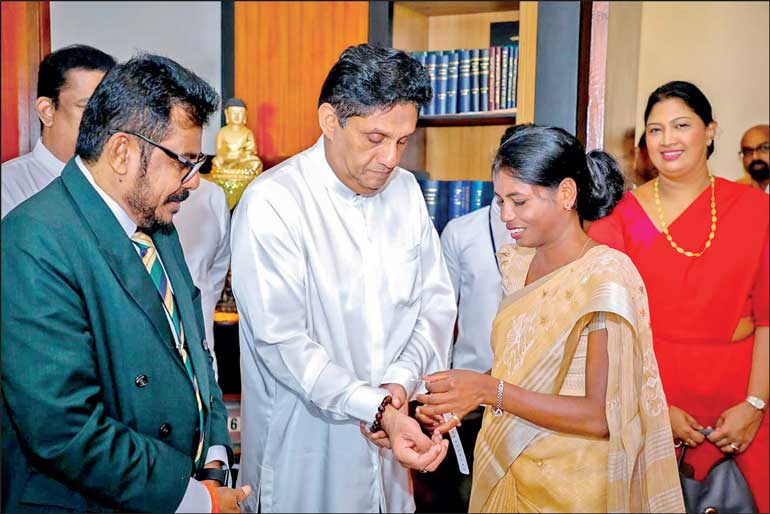
Makes landmark speech on debt
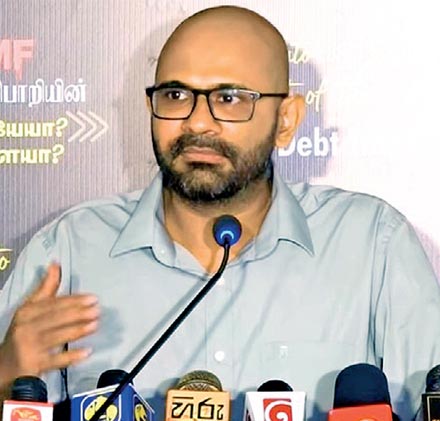
Dhanusha Pathirana dismembers debt-deal
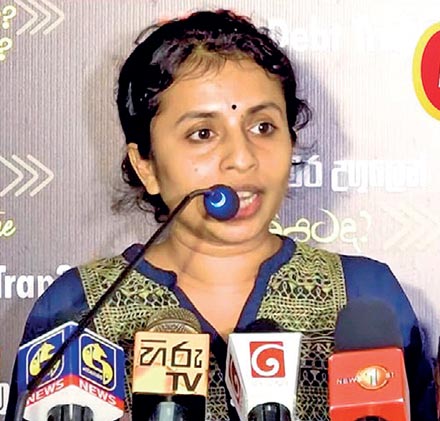
Swasthika Arulingam: Private bondholders’ grip
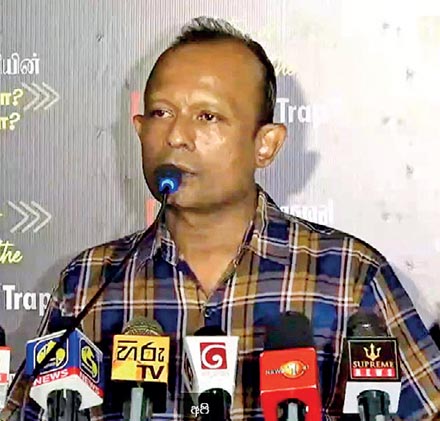
Pubudu Jayagoda critiques sellout
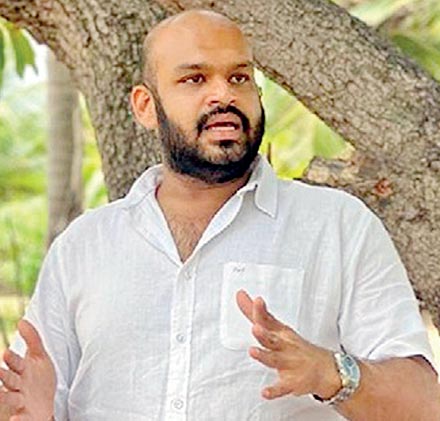
Shanakiyan Rasamanickam: Tamil AKD?
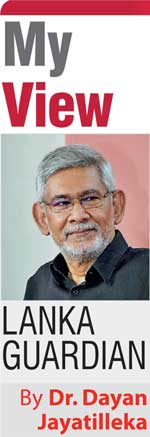 However formidable, even brilliant, a leader and protagonist in the national political arena President Anura Kumara Dissanayake is, dialectics in general and the dialectics of the debt deal in particular, will undermine and undo AKD-NPP rule. A contradiction lies embedded at the very heart of the Government between the NPP’s progressive political sociology—its generational and gender configuration—and its regressive political economy. AKD and the NPP’s economic decisions; their choice of economic strategy and model; their economic turn, will erode and disintegrate the NPP social bloc and vote-base—and cannot but do so. Anura is determined, but the economy is the determinant.
However formidable, even brilliant, a leader and protagonist in the national political arena President Anura Kumara Dissanayake is, dialectics in general and the dialectics of the debt deal in particular, will undermine and undo AKD-NPP rule. A contradiction lies embedded at the very heart of the Government between the NPP’s progressive political sociology—its generational and gender configuration—and its regressive political economy. AKD and the NPP’s economic decisions; their choice of economic strategy and model; their economic turn, will erode and disintegrate the NPP social bloc and vote-base—and cannot but do so. Anura is determined, but the economy is the determinant.
Every leader, if he/she wants to be well-regarded by history, has to successfully tackle the greatest challenge, successfully resolve the greatest problem, defeat the greatest danger, facing his/her country at the time of entering office, leaving the country better on that front, before the term he/she was elected to ends. Mahinda Rajapaksa, and before him, Ranasinghe Premadasa, did just that. Premadasa was the UNP’s SWRD. Mahinda was the SLFP’s Premadasa.
The chief challenge facing AKD is the debt crisis. Inheriting a country deep in the debt trap, he has decided to take it deeper still, rather than try to extricate us from it. He is heading in exactly the opposite direction from which he should.
In 2021, Gotabaya’s Central Bank Governor Ajith Nivard Cabraal made a repayment on ISB debt against the public advice of Dr Nishan de Mel who almost yelled that there will be no dollars left for essential imports such as fuel. Informed speculation was rife that the payout was foolishly made, gouging out our reserves, because there were local ISB holders with an inside-track to the Gotabaya government or top officials.
Cabraal’s answer was that if the payout wasn’t made the country would have defaulted and be considered bankrupt. This is a precursor and prototype of the justification by AKD’s economic team and Ministers today regarding the imminent ISB deal. What Nishan de Mel warned of, happened--and the Aragalaya arose, sweeping away the Gotabaya presidency. It wasn’t Ambassador Julie Chung and a ‘colour revolution’. It was a replay of the August 1953 Hartal.
Once again, the ISB holders are being prioritised, this time by the AKD presidency. This time they have an even higher-placed link to the policy process and the decision-making apex. Though the exact sequence won’t repeat itself --the outcome will probably not be an Aragalaya-- the cumulative blowback cannot but prove decisive.
The big story
Thanks to my journalist father, I can sense when I am living through a major news story. The big story is that:
(A) Sri Lanka, as represented by the AKD administration, is about to enter a highly deleterious deal with the private creditors (ISB holders), most probably today, December 12th. The deal will determine the economic destiny of the country and negatively impact the standard of living and life chances of the overwhelming majority of our citizens, i.e., us, for decades to come.
(B) Leader of the Opposition Sajith Premadasa speaking during the Vote of Account of Dec 6th, offered the Government time and space, conditional support and a chance to stop short of the abyss. He alerted Parliament about the dangerous downside of the proposed agreement, urged a debate and vote in which the Opposition would support the Government in a Resolution calling for a time-out and renegotiation of terms along the lines obtained by Ghana.
(C) The Government’s response in Parliament, expressed by top JVP Cabinet Ministers, most authoritatively Foreign Minister Vijitha Herath, was a flat ‘NO’, and reiteration of the determination to drive ahead with the deal according to the prearranged time table.
The Daily FT summarised the Opposition Leader’s landmark proposal in bullet points:
 Calls on Govt. to present agreement to Parliament for discussion.
Calls on Govt. to present agreement to Parliament for discussion.
 Warns on enacting current agreement as it could put country into debt trap for decades.
Warns on enacting current agreement as it could put country into debt trap for decades.
 Criticises Govt. for hastily accepting terms without thorough review, prioritising access to extensive debt facilities over long-term economic stability.
Criticises Govt. for hastily accepting terms without thorough review, prioritising access to extensive debt facilities over long-term economic stability.
 Extends cooperation to revise agreement.
Extends cooperation to revise agreement.
Here’s an extract:
“Opposition leader Sajith Premadasa yesterday…called for the Parliament to be convened before 12 December, as initially proposed by the Government, to present the agreement to the legislative body for discussion.
He also said that the Opposition is prepared to cooperate during the debate, provided the focus is on securing better terms for the country.
Citing Ghana as an example, he stressed the importance of bipartisan efforts to negotiate a more favourable agreement and urged the Government to present the full details of the IMF arrangement to Parliament before its implementation.
He warned that the current agreement, if enacted, could plunge the country into a debt trap for decades.
Premadasa highlighted a contradiction between the Government’s actions and the vision outlined in its election manifesto, “Prosperous Country and a Beautiful Life,” which proposed alternative methods for sustainable debt management in partnership with the IMF.
…Premadasa warned that pursuing the current…agreement could derail the path to achieving the promised prosperity and better living standards, effectively collapsing the country’s future prospects.
He also pointed out that in the IMF’s March 2023 report, debt repayment was slated to begin in 2033. However, under the new agreement, repayment was expedited to 2028, placing the country under greater financial strain. He criticised the Government for hastily accepting terms without thorough review, prioritising access to extensive debt facilities over long-term economic stability. He urged the Government to renegotiate the agreement to better safeguard the country’s interests.
Drawing attention to Ghana’s success in debt reduction, Premadasa highlighted how Ghana negotiated a 37% reduction in debt and secured a 6% interest rate with the IMF. In contrast, Sri Lanka, under the current agreement, faces significantly worse terms.
He noted that based on an average GDP of $107 billion between 2025 and 2028, Sri Lanka will need to pay an additional $ 2.3 billion in debt compared to its previous commitments.
He also warned that interest rates could escalate from 6.8% in 2028 to 9.65% by 2032.
Premadasa argued that Sri Lanka, like Ghana, could achieve better terms by rejecting unfavourable proposals and pursuing more strategic negotiations. However, under the current circumstances, the government has failed to secure meaningful debt reductions.
Premadasa expressed concerns about the growing debt burden and its impact on vulnerable groups. He warned that prioritising excessive debt repayment would lead to decreased investments in essential sectors like education, healthcare, agriculture, and fisheries.
He reiterated his willingness to offer practical solutions to address these challenges and called on the Government to adopt a more inclusive and sustainable approach.
Premadasa also criticised the Government for embracing neoliberal economic policies under President Ranil Wickremesinghe’s leadership, which he argued exacerbate inequality and social challenges. He called for a middle path between extreme capitalism and socialism, advocating for a model of “humanitarian capitalism.”
He referenced the Opposition’s previous stance against domestic debt restructuring as an example of protecting national interests and called on all parties to unite in safeguarding the country’s future.”
(https://www.ft.lk/front-page/Opposition-leader-tells-Govt-not-to-turn-back-on-people-s-mandate/44-770224)
In my previous column I shared a diagnostic note from a top-notch economist in the international circuit. Here’s a 5-point update from the same expert:
1. Sri Lanka faces significant financial challenges in 2025, with repayments on International Sovereign Bonds (ISBs) expected to total around $1.85 billion, including $420 million in interest on bilateral debt.
2. In addition, lifting the import ban on personal vehicles will lead to an estimated $1.5 billion in outflows, pushing the total additional funding needed to $3.4 billion.
3. Although debt maturity periods have been extended, this has led to higher long-term interest payments. From 2028, the average interest rate on ISBs is expected to rise to 6.8%, and after 2032, it could reach 9.75% for six years. The IMF’s debt sustainability analysis (DSA) sets a target for Sri Lanka’s debt-to-GDP ratio at 95%, but this excludes the present value of interest payments. As a result, it misleadingly suggests Sri Lanka’s repayment capacity is stronger than that of highly stable economies.
4. Heavy debt repayments will likely weaken the country’s currency over time. Under the recent agreement with bondholders, Sri Lanka has forfeited the legal right to negotiate higher debt relief. Creditors now have the authority to change the governing law for Sri Lanka’s ISBs. There’s no evidence that the government’s financial advisors, who maintain close ties with creditors, are acting in the best interests of Sri Lanka’s people.
5. Additionally, creditors knowingly extended loans despite Sri Lanka’s debt exceeding its government revenue by tenfold, reflecting predatory lending practices. This violates established norms in responsible lending, further exacerbating the country’s financial instability.
AKD’s choices, March of Folly
The fateful decision by President Anura Dissanayake and his Cabinet to greenlight the ISB deal belongs in the same category as:
1. Prime Minister SWRD Bandaranaike’s decision to implement Sinhala only in 24 hours.
2. Prime Minister Sirimavo Bandaranaike’s decision to extend the life of Parliament by two years.
3. President JR Jayewardene’s decision to hold a referendum in December 1982 having instead of the scheduled Parliamentary election of early 1983.
4. The JVP Politbureau’s 1989 decision to reject President Premadasa’s unilateral ceasefire, prisoner release, and offer of three Cabinet portfolios, and to resume the civil war instead.
5. Prime Minister President Ranil Wickremesinghe’s Ceasefire Agreement appeasing the Tigers (2002).
6. President Chandrika Bandaranaike Kumaratunga’s decision not to capitalise on the moral advantage of the assassination attempt on her by the LTTE and the military advantage of her successful defence of Jaffna, and to negotiate instead with the Tigers via Norway, proposing an asymmetric power-sharing mechanism, the PTOMS (2005).
These decisions belong to the category that historian Barbara Tuchman captured in her classic work ‘The March of Folly’.
AKD had a credible case to make with the ISB holders: his is a new administration with a fresh, massive mandate he cannot turn his back on; he needs time and space to examine the agreements arrived at by outgoing Ranil Wickremesinghe who had no popular mandate and to present in a compressed time-frame, revised proposals or adjustments more in keeping with the NPP manifesto and mandate. Anura chose not to make this case.
Anura, Vijitha or Harini could have attended the BRICS Summit, raised the debt issue, explored options in bilateral discussions, attempted a countervailing coalition on debt, and/or sought a pool of expert advisors. They chose not to seek elbow-room and a counterweight for Sri Lanka through a multipolar, multitrack approach.
AKD chose to stay on Ranil’s track with the ISB holders.
He also chose to go beyond Ranil and have the Chairman, Ceylon Chamber of Commerce which contains ISB holders, as senior advisor and international negotiator, thereby ensuring, as Swasthika Arulingam said recently, a grotesque anomaly: the picture emerges, not so much of the Sri Lankan state/government team fighting to cut the best deal for the country and its citizens while facing the foreign private bondholders across the table, but of a team including the chief of the corporate confederation which contains local private bondholders. Thus, local private bondholder interests faced foreign private bonder interests, with private bondholder interests represented on both sides of the negotiating table, inevitably inclined to look for the best deal-- for private bondholders. (https://youtu.be/fIAZBKHvKeU?si=OEIwG5Htcab2-amR)
The NPP-JVP chose to endorse the process and outcome with no dissent (unlike Prime Minister Premadasa on the Accord/IPKF).
The NPP-JVP chose not to take the ‘time-out/reload negotiations’ option proffered by Opposition leader Premadasa.
The Government will use bounce in the stock markets and an upgrade of ratings to return to the international money markets and borrow, thereby increasing our debts and interest payments, while repaying the old ones.
The JVP Ministers’ imperious response to Sajith Premadasa’s constructive offer reminded me of a joke that Foreign Minister Lakshman Kadirgamar was fond of cracking in after-dinner remarks. It was about the President who opens his speech somberly with: “This nation has arrived at the very brink of a precipice”, and concludes with a resounding “I assure you that under the leadership of my government and party, this nation will make a Great Leap Forward!”
Optimistic about Opposition
The Tamil political scene hasn’t registered that the community has produced its next leader: Batticaloa’s Shanakiyan Rasamanickam, outspoken, outstanding Opposition parliamentarian; gifted orator; and best possible (trilingual) interlocutor with the State, the South and the world. Is he the Tamil AKD?
In 1970-’77 the UF Government’s domineering style and overweening arrogance ‘environmentally’ forced the Opposition UNP with merely 17 MPs to evolve into the combative, populist-democratic (NOT ‘Rightwing’) mass party/movement that won a 5/6th majority in one term. Today, haughty hectoring from massed NPP-JVP ranks and tight regimentation of the Opposition by parliamentary commissars Bimal Ratnayake and Nalinda Jayatissa, have stiffened SJB/SJS spines. Dialectically, the NPP Behemoth is turning the SJB into a band of besieged gladiators.
However, the SJB is still confused in its ideological identity and direction, with some calling for ‘unity of the Right’ and applauding the Govt’s rightist ‘conversion’. Emphasizing on ‘Salakuna’ (Dec 9th) that the SJB and UNP had “the same members” – something SWRD Bandaranaike and the SLFP never once considered saying from 1951 onwards--Harsha de Silva pitched for “unity of those with a shared ideology”. But which ideology? Firstly, the UNP is non-existent, the Elephant extinct. Secondly, no self-proclaimed Right or Rightist ever won an election to lead Sri Lanka. The 1977 UNP ‘brand’ wasn’t ‘Rightist’.
When the NPP, having won as a left-populist movement on a centre-left platform surfing an anti-austerity wave, is shifting drastically to the neoliberal Right, it is lunacy for the Opposition to compete with it on the Right rather than shift into the soon-to-be-vacated centre-left space and win over that vast vote. That is far more feasible than to trying to swing those voters all the way over to the Right.
If the SJB takes the Harsha-Eran line, the massive centre-left, populist-patriotic vote will swing from AKD-NPP to the dynamic, personable Namal Rajapaksa (NR), not Dilith Jayaweera. Dilith is to NR, what GR is to MR.
If not, popular economic discontent could shift further Left, taking the JVP-NPP or a faction with it, or catapulting an authentic Left alternative as agency.
Left Opposition
The Left Opposition, namely the Frontline Socialist Party (FSP)/People’s Struggle Alliance (PSA), is doing what a sincere left should: shine a light, ‘speak truth to power’.
Principal author of ‘A History of Underdevelopment and the Political Economy of Inflation in Sri Lanka’ (Palgrave Macmillan, UK, 2020) Dhanusha Gihan Pathirana disemboweling AKD’s debt policy with his analytical lightsaber at the recent PSA seminar, makes impressive, imperative watching. (https://youtu.be/-mFeDZKlWZw?si=FOMXSyq1oq57NbSs).
FSP Educational Secretary Pubudu Jayagoda, trained civil engineer, leading ‘organic intellectual’ and public policy pedagogue, hammers home that the total outflow of dollars by the superrich since Ranil’s foreign exchange liberalisation of 2017 (which JR and Premadasa managed perfectly well without) exceeds the total foreign debt of Sri Lanka. That’s a damning moral-ethical indictment. (https://youtu.be/TnZ5eXLEdyI?si=PPZFYqoTqSVqRY4d)
[For my electronic archive, please visit: https://dayanjayatilleka.webflow.io/]